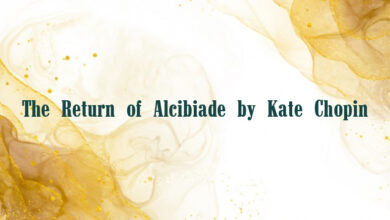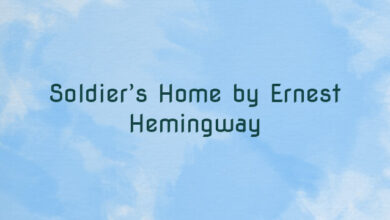
The Blue Suit by Arnold Bennett
I was just going into my tailor’s in Sackville Street, when who should be coming out of the same establishment but Mrs Ellis! I was startled, as any man might well have been, to see a lady emerging from my tailor’s. Of course a lady might have been to a tailor’s to order a tailor-made costume. Such an excursion would be perfectly legal and not at all shocking. But then my tailor did not “make” for ladies. And moreover, Mrs Ellis was not what I should call a tailor-made woman. She belonged to the other variety–the fluffy, lacy, flowing variety. I had made her acquaintance on one of my visits to the Five Towns. She was indubitably elegant, but in rather a Midland manner. She was a fine specimen of the provincial woman, and that was one of the reasons why I liked her. Her husband was a successful earthenware manufacturer. Occasionally he had to make long journeys–to Canada, to Australia and New Zealand–in the interests of his business; so that she was sometimes a grass-widow, with plenty of money to spend. Her age was about thirty-five; bright, agreeable, shrewd, downright, energetic; a little short and a little plump. Wherever she was, she was a centre of interest! In default of children of her own she amused herself with the children of her husband’s sister, Mrs Carter. Mr Carter was another successful earthenware manufacturer. Her favourite among nephews and nieces was young Ellis Carter, a considerable local dandy and “dog.” Such was Mrs Ellis.
“Are you a widow just now?” I asked her, after we had shaken hands.
“Yes,” she said. “But my husband touched at Port Said yesterday, thank Heaven.”
“Are you ordering clothes for him to wear on his arrival?” I adopted a teasing tone.
“Can you picture Henry in a Sackville Street suit?” she laughed.
I could not. Henry’s clothes usually had the appearance of having been picked up at a Jew’s.
“Then what are you doing here?” I insisted.
“I came here because I remembered you saying once that this was your tailor’s,” she said, “so I thought it would be a pretty good place.”
Now I would not class my tailor with the half-dozen great tailors of the world, but all the same he is indeed a, pretty good tailor.
“That’s immensely flattering,” I said. “But what have you been doing with him?”
“Business,” said she. “And if you want to satisfy your extraordinary inquisitiveness any further, don’t you think you’d better come right away now and offer me some tea somewhere?”
“Splendid,” I said. “Where?”
“Oh! The Hanover, of course!” she answered.
“Where’s that?” I inquired.
“Don’t you know the Hanover Tea-rooms in Regent Street?” she exclaimed, staggered.
I have often noticed that metropolitan resorts which are regarded by provincials as the very latest word of London style, are perfectly unknown to Londoners themselves. She led me along Vigo Street to the Hanover. It was a huge white place, with a number of little alcoves and a large band. We installed ourselves in one of the alcoves, with supplies of China tea and multitudinous cakes, and grew piquantly intimate, and then she explained her visit to my tailor’s. I propose to give it here as nearly in her own words as I can.
I
I wouldn’t tell you anything about it (she said) if I didn’t know from the way you talk sometimes that you are interested in people. I mean any people, anywhere. Human nature! Everybody that I come across is frightfully interesting to me. Perhaps that’s why I’ve got so many friends–and enemies. I have, you know. I just like watching people to see what they do, and then what they’ll do next. I don’t seem to mind so much whether they’re good or naughty–with me it’s their interestingness that comes first. Now I suppose you don’t know very much about my nephew, Ellis Carter. Just met him once, I think, and that’s all. Don’t you think he’s handsome? Oh! I do. I think he’s very handsome. But then a man and a woman never do agree about what being handsome is in a man. Ellis is only twenty, too. He has such nice curly hair, and his eyes–haven’t you noticed his eyes? His father says he’s idle. But all fathers say that of their sons. I suppose you’ll admit anyhow that he’s one of the best-dressed youths in the Five Towns. Anyone might think he got his clothes in London, but he doesn’t. It seems there’s a simply marvellous tailor in Bursley, and Ellis and all his friends go to him. His father is always grumbling at the bills, so his mother told me. Well, when I was at their house in July, there happened to come for Ellis one of those fiat boxes that men’s tailors always pack suits in, and so I thought I might as well show a great deal of curiosity about it, and I did. And Ellis undid it in the breakfast-room (his father wasn’t there) and showed me a lovely blue suit. I asked him to go upstairs and put it on. He wouldn’t at first, but his sisters and I worried him till he gave way.
He came downstairs again like Solomon in all his glory. It really was a lovely suit. No–seriously, I’m not joking. It was a dream. He was very shy in it. I must say men are funny. Even when they really like having new clothes and cutting a figure, they simply hate putting them on for the first time. Ellis is that way. I don’t know how many suits that boy hasn’t got–sheer dandyism!–and yet he’ll keep a new suit in the house a couple of months before wearing it! Now that’s the sort of thing that I call “interesting.” So curious, isn’t it? Ellis wouldn’t keep that suit on. No; as soon as we’d done admiring it he disappeared and changed it.
Now I’d gone that day to ask Ellis to escort me to Llandudno the week after. He likes going about with his auntie, and his auntie likes to have him. And of course she sees that it doesn’t cost him anything. But his father has to be placated first. There’s another funny thing! His father is always grumbling that Ellis is absolutely no good at all at the works, but the moment there’s any question of Ellis going away for a holiday–even if it’s only a week-end–then his father turns right round and wants to make out that Ellis is absolutely indispensable. Well, I got over his father. I always do, naturally. And it was settled that Ellis and I should go on the next Saturday.
I said to Ellis:
“You must be sure to bring that suit with you.”
And then–will you believe me?–he stuck to it he wouldn’t! Truly I was under the impression that I could argue either Ellis or his father into any mortal thing. But no! I couldn’t argue Ellis into agreeing to bring that suit with him to Llandudno. He said he should wear whites. He said it was a September suit. He said that everybody wore blue at Llandudno, and he didn’t want to be mistaken for a schoolmaster! Imagine him being mistaken for a schoolmaster! He even said there were some things I didn’t understand! I told him there was a very particular reason why I wanted him to take that suit. And there was. He said:
“What is the reason?”
But I wouldn’t tell him that. I wasn’t going to knuckle down to him altogether. So it ended that we didn’t either of us budge. However, I didn’t mean to be beaten by a mere curly-headed boy. I can do what I please with his mother, though she is my eldest sister-in-law. And before he started in the dogcart to meet me at the station on our way to Llandudno she gave Ellis a bonnet-box to hand to me, and told him to take great care of it. He handed it over to me, and I also told him to take great care of it. Of course he became very curious to know what was in it. I said to him:
“You may see it on the pier on Monday. In fact, I believe you will.”
He said: “It’s heavy for a hat.”
So I informed him that hats were both heavy and large this summer.
He said, “Well, I pity you, auntie!”
Naturally it was his blue suit that was in the box. His mother had burgled it after he’d done his packing, while he was having lunch.
I was determined he should wear that suit. And I felt pretty sure that when he saw my reason for asking him to bring it he’d be glad at the bottom of his heart that I’d brought it in spite of him. There is one good thing about Ellis–he can see a joke against himself…. Have another cake. Well, I will, then…. Yes, I’m coming to the reason.
II
A girl, you say? Well, of course. But you mustn’t look so proud of yourself. A body needn’t be anything like so clever as you are to be able to guess that there’s a girl in it. Do you suppose I should have imagined for a moment that it would interest you if there hadn’t been a girl in it? Not exactly! Well, it’s a girl from Winnipeg. Came to England in June with her parents. Or rather, perhaps, her parents came with her. I’d never seen any of the three before–didn’t know them from Adam and Eve. But my husband had made friends with them out there last year–great friends. And they wanted to make the acquaintance of my husband’s wife. I’d gathered from Harry that they were quite my sort…. What is my sort? You know perfectly well what my sort is. There are only two sorts of people–the decent sort and the other sort. Well, they were doing England–you know, like Colonial people do–seriously, leaving nothing out. By the way, their name was only “Smith,” without even a “y” in it or an “e” at the end. They wished to try a good seaside place, so I wrote to them and suggested Llandudno as a fair specimen, and it was arranged that we should meet there and spend at least a week together, and afterwards they were to come to the Five Towns. I suggested we should all stay at Hawthornden’s … Hawthornden’s? Don’t you know–it’s easily the best private hotel in Llandudno. Lift and a French chef and all kinds of things; but surely you must have seen all about it in the papers!
Now that was why I took Ellis with me. I hate travelling about alone, especially when my husband’s away. And it was particularly on account of the girl that I stole the blue suit. But I didn’t tell Ellis a word about the girl, and I only just mentioned the father and mother–and not even that until we were safely in the train. These young dandies are really very nervous and timid at bottom, you know, in spite of their airs. Ellis would walk ten miles sooner than have to meet a stranger of the older generation. And he’s just as shy about girls too. I believe most men are, if you ask me.
The great encounter occurred in the hall, just before dinner. They were late, and so were we. I tell you, we were completely outshone. I tell you, we were not in it, not anywhere near being in it! For one thing, they were in evening-dress. Now at Hawthornden’s you never dress for dinner. There isn’t a place in Llandudno where it’s the exception not to dress for dinner. They seemed rather surprised; not put out, not ashamed of themselves for being too swagger, but just mildly disappointed with Hawthornden’s. The fact is, they didn’t think much of Hawthornden’s. I learnt all manner of things during dinner. They’d been in Scotland when I corresponded with them, but before that they’d stayed at the Ritz in London, and at the Hotel St Regis in New York, and the something else–I forget the name–at Chicago. I was expecting to meet “Colonials,” but it was Ellis and I who were “colonial.” I could have borne it better if they hadn’t been so polite, and so anxious to hide their opinion of Hawthornden’s. The girl–oh! the girl…. Her name is Nellie. Really very pretty. Only about eighteen, but as self-possessed as twenty-eight. Evidently she had always been used to treating her parents as equals; she talked quite half the time, and contradicted her mother as flatly as Ellis contradicts me. Mr Smith didn’t talk much. And Ellis didn’t at first–he was too timid and awkward–really not at all like himself. However, Miss Nellie soon made him talk, and they got quite friendly and curt with each other. Curious thing–Ellis never notices women’s clothes; very interested in his own, and in other men’s, but not in women’s! So I expect Nellie’s didn’t make much impression on him. But truly they were stylish. Much too gorgeous for a young girl–oh! you’ve no idea!–but not vulgar. They’d been bought in London, in Dover Street. Better than mine, and better than her mother’s. I will say this for her–she wore them without any self-consciousness, though she came in for a good deal of staring. Heaven knows what they cost! I’d be afraid to guess. But then you see the Smiths had come to England to spend money, and–well–they were spending it. All their ideas were larger than ours.
When dinner was over Nellie wanted to know what we could do to amuse ourselves. Well, it was a showery night, and of course there was nothing. Then Ellis said, in his patronizing way:
“Suppose we go and knock the balls about a bit?”
And Nellie said, “Knock the balls about a bit?”
“Yes,” said Master Ellis, “billiards–you know.”
All four of us went to the billiard-room. And Ellis began to knock the balls about a bit. His father installed a billiard-table in his own house a few years ago. The idea was to “keep the boy at home.” It didn’t, of course, not a bit. Ellis is a pretty good player, but he did nearly all his practising at his club. I’ve often heard his mother regret the eighty pounds odd that that billiard-table cost…. I play a bit, you know. Nellie Smith would not try at first, and Papa Smith was smoking a cigar and he said he couldn’t do justice to a cigar and a cue at the same time. So Ellis and I had a twenty-five up. He gave me ten and I beat him–probably because he would keep on smoking cigarettes, just to show Papa Smith how well he could keep the smoke out of his eyes. Then he asked Nellie if she’d “try.” She said she would if her pa would. And she and her pa put themselves against Ellis and me.
Well, I’ll cut it short. That girl, with her pink-and-white complexion–she began right off with a break of twenty-eight. You should have seen Ellis’s face. It was the funniest thing I ever saw in my life. I can’t remember anything that ever struck me as half so funny. It seems that they have plenty of time for billiards out in Winnipeg, and a very high-class table. After a while Ellis saw the funniness of it too. He made a miss and then he said:
“Will someone kindly take me out and bury me?”
That kind of speech is supposed to be very smart at his club. And the Smiths thought it was very smart too. Nellie and her pa beat us hollow, and then Nellie began to take her pa to task for showing off with too much screw instead of using the natural angle!
Ellis went to bed. He was very struck by Nellie’s talents. But he went to bed. Probably he wanted to think things over, and consider how he could be impressive with her. I should like to have broken it to him about his blue suit, because it was Sunday the next day, and Nellie was bound to be gorgeous for chapel and the pier, and I felt sure he’d be really glad to have that suit–whatever he might say to me. And I wanted him to wear it too. But there was no chance for me to tell him. He went off to bed like a streak of lightning. And usually, you know, he simply will not go to bed. Nothing will induce him to go to bed, just as nothing will induce him to get up. I said to myself I would send the suit into his room early in the morning with a note. I did want him to look his best.
And then of course there was the fire. The fire was that very night. What?…
III
Do you actually mean to sit there and tell me you never heard about the fire at Hawthornden’s Hotel last July? Why, it was the sensation of the season. There was over a column about it in the Manchester Guardian. Everybody talked of it for weeks…. And no one ever told you that we were in it? Half the annexe was burnt down. We were in the annexe, all four of us. I fancy the Smiths had chosen it because the rooms in the annexe are larger. Have you ever been in a fire?… Well, thank your stars! We were wakened up at three o’clock. It was getting light, even. Somehow that made it worse. The confusion–you can’t imagine it. We got out all right. Oh! there was no special danger to life and limb. But after all we only did get out just in time. And with practically nothing but our dressing-gowns–some not even that! It’s queer, in a fire, how at first you try to save things, and keep calm, and pretend you are calm, until the thing gets hold of you. I actually began to shovel clothes into my trunks. Somebody said we should have time for that. Well–we hadn’t. And it was a very good thing there wasn’t a lift in the annexe. It seems a lift well acts like a chimney, and half of us might have been burnt alive.
I must say the fire-brigade was pretty good. They got the fire out very well–very quickly in fact. We women, or most of us, had been bundled into private parlours and things in the main part of the hotel, which wasn’t threatened, and when we knew that the fire was out we naturally wanted to go back and see whether any of our things could be saved out of the wreck.
Oh! what a sight it was! What a sight it was! You’d never believe that so much damage could be done in an hour or so. Chiefly by water, of course. All the ground floor was swimming in water. In fact there was a river of it running across the promenade into the sea. About five-sixths of Llandudno, dressed nohow, was on the promenade. However, policemen kept the people outside the gates.
The firemen began bringing trunks down the stairs; they wouldn’t let us go up at first. It really was a wonderful scene, at the foot of the stairs, lots of us paddling about in that lake, and perfectly lost to all sense of–what shall I say?–well, correctness. I do believe most of us had forgotten all about civilization. We wanted our things. We wanted our things so badly that we even lost our interest in the origin of the fire and in the question whether we should get anything out of the insurance company. By the way, I mustn’t omit to tell you that we never saw the proprietors after the fire was out; the proprietors could only be seen by appointment. The German and Swiss waiters had to bear the brunt of us.
I was very lucky. I received both my trunks nearly at once. They came sliding on a plank down those stairs. And most of my things were in them too. I was determined to be energetic then, and to get out of all that crowd. Do you know what I did? I simply called two men in out of the street, and told them to shoulder my trunks into the main building of the hotel. I defied policemen and the superintendent of the fire-brigade. And in the main building I demanded a bedroom, and I was told that everything would be done to accommodate me as quickly as possible. So I went straight upstairs and told the men to follow me, and I began knocking at every door till I found a room that wasn’t occupied, and I took possession of it, and gave the men a shilling a piece. They seemed to expect half-a-crown, because I’d been in a fire, I suppose! Curious ideas odd job men have! Then I dressed myself out of what was left of my belongings and went down again.
All the people said how lucky I was, and what presence of mind I had, and how calm and practical I was, and so on and so on. But they didn’t know that I’d been stupid enough not to give a thought to Ellis’s blue suit. One can’t think of everything, and I didn’t think of that. I believe if I had thought of it, at the start, I should have taken the bonnet-box with me at any cost.
I came across Ellis; smoking a cigarette, of course, just to show, I suppose, that a fire was a most ordinary event to him. He was completely dressed, like me. He had saved the whole of his belongings. He said the Smiths were fixing themselves up in private rooms somewhere, and would be down soon. So we moved along into the dining-room and had breakfast. The place was full and noisy. Ellis was exceedingly facetious. He said:
“Well, auntie, did you have a pretty good night?”
Also:
“A fire is a very clumsy way of waking you up in the morning. A bell would be much simpler, and cost less,” etcetera, etcetera. And then he said:
“A nice thing, auntie, if I’d followed your advice and brought my beauteous new suit! It would have been bound to be burnt to a cinder. One’s best suit always is in a fire.”
I ought to have told him then the trick I’d played on him, but I didn’t. I merely agreed with him in a lame sort of way that it would have been a nice thing if he’d brought his beauteous suit. I hoped that I might be able later on to invent some good excuse, something really plausible, for having brought along with me his newest suit unknown to him. But the more I reflected the more I couldn’t think of anything clever enough.
Then the three Smiths came in. There was some queer attire in that dining-room, but I think that Mrs Smith won the gold medal for queerness. All her “colonialness” had come suddenly out. They evidently hadn’t been very fortunate. But they didn’t seem to mind much. They hadn’t thought very highly of the hotel before, and they accepted the fire good-humouredly as one of the necessary drawbacks of a hotel that wasn’t quite up to their Winnipeg form. Nellie Smith was delightful. I must say she was delightful, and she looked delightful. She was wearing a blue-and-red striped petticoat, rather short, and a white jersey, and over that a man’s blue jacket, which fitted her pretty well. She looked indescribably pert and charming, though the jacket was dirty and stained.
I noticed Ellis staring and staring at that jacket….
I needn’t tell you. You can see a mile off what had happened.
Ellis said in his casual way:
“Hello! Where did you pick up that affair, Miss Smith?” Meaning the jacket.
She said she had picked it up on one of the landings, and that there was a pair of continuations lying in a broken bonnet-box just close to it, and that the continuations were ruined by too much water.
I could feel myself blushing redder and redder.
“In a bonnet-box, eh?” said Master Ellis.
Then he said: “Would you mind letting me look at the right-hand breast-pocket of that jacket?”
She didn’t mind in the least. He looked at the strip of white linen that your men’s tailors always stitch into that pocket with your name and address and date, and age and weight, and I don’t know what.
He said, “Thank you.”
And she asked him if the jacket was his.
“Yes,” he said, “but I hope you’ll keep it.”
Everybody said what a very curious coincidence! Ellis avoided my eyes, and I avoided his…. Will you believe me that when we “had it out” afterwards, he and I, that boy was seriously angry. He suspected me of a plan “to make the best of him” during the stay with the Smiths, and he very strongly objected to being “made the best of.” His notion apparently was that even his worst was easily good enough for my Colonial friends, although, as he’d have said, they had “simply wiped the floor with him” in the billiard-room. Anyhow, he was furious. He actually used the word “unwarrantable,” and it was rather a long word for a mere stripling of a nephew to use to an auntie who was paying all his expenses. However, he’s a nice enough boy at the bottom, and soon got down off his high horse. I must tell you that Nellie Smith wore that jacket all day, quite without any concern. These Colonials don’t really seem to mind what they wear. At any rate she didn’t. She was just as much at ease in that jacket as she had been in her gorgeousness the evening before. And she and Ellis were walking about together all day. The next day of course we all left. We couldn’t stay, seeing the state we were in…. Now, don’t you think it’s a very curious story?
Thus spake Mrs Ellis across the tea-table in an alcove at the Hanover.
“But you’ve not finished the story!” I explained.
“Yes, I have,” she said.
“You haven’t explained what you were doing at my tailor’s in Sackville Street.”
“Oh!” she cried, “I was forgetting that. Well, I promised Ellis a new suit. And as I wanted to show him that after all I had larger ideas about tailoring than he had, I told him I knew a very good tailor’s in Sackville Street–a real West End tailor–and that if he liked he could have his presentation suit made there. He pooh-poohed the offer at first, and pretended that his Bursley tailor was just as good as any of your West End tailors. But at last he accepted. You see–it meant an authorized visit to London…. I’d been into the tailor’s just now to pay the bill. That’s all.”
“But even now,” I said, “you haven’t finished the story.”
“Yes, I have,” she replied again.
“What about Nellie Smith?” I demanded. “A story about a handsome girl named Nellie, who could make a break of twenty-eight at billiards, and a handsome dog like Ellis Carter, and a fire, and the girl wearing the youth’s jacket–it can’t break off like that.”
“Look here,” she said, leaning a little across the table. “Did you expect them to fall in love with each other on the spot and be engaged? What a sentimental old thing you are, after all!”
“But haven’t they seen each other since?”
“Oh yes! In London, and in Bursley too.”
“And haven’t they–“
“Not yet…. They may or they mayn’t. You must remember this isn’t the reign of Queen Victoria…. If they do, I’ll let you know.”




